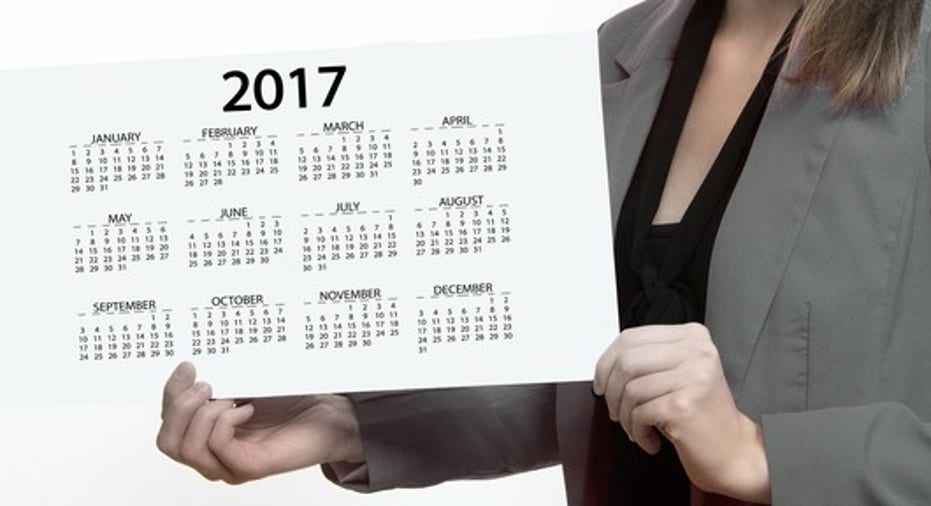2017 Social Security Payments Schedule

Social Security income is critically important to most of the people who receive it. Indeed, accordingto the Social Security Administration, the majority of elderly beneficiaries get 50% or more of their income from Social Security, while 21% of married elderly beneficiaries and 43% of unmarried ones get fully 90% or more of their income from it. Thus, many retirees are quite reasonably interested in exactly when their checks will arrive.
Image source: Pixabay.
When to expect your Social Security payments
The question of when to expect Social Security benefits to pop up in your bank account (because the funds are mostly delivered by direct deposit these days) is a simple one. The Social Security Administration (SSA) even offers a handy calendar with all the details.
Here's the scoop, though: Payments are generally made to each retirement beneficiary on one Wednesday per month. Which Wednesday exactly depends on your birth date:
- If your birthday falls on the first to the 10th of your birth month, you'll receive your payments on the second Wednesday of each month.
- If your birthday falls on the 11th to the 20th of your birth month, you'll receive your payments on the third Wednesday of each month.
- If your birthday falls on the 21st to the 31st of your birth month, you'll receive your payments on the fourth Wednesday of each month.
See? Simple.
There's a littletwist, though, for those who were receiving benefits before May 1997. They are paid on the third of each month -- or on first or second if the third falls on a weekend. It's the same for those who receive both Social Security retirement benefits and Supplemental Security Income benefits and those who live abroad.
Image source: Getty Images.
How much to expect from Social Security payments
The average Social Security retirement benefit was recently $1,352per month, or about $16,224 per year -- not exactly a princely sum. That's an average, though, meaning that while some people struggle to get by with less than that, others collect more. If your income throughout your working life was above average, you can expect to collect above-average Social Security benefits, too -- though not more than about $32,000, as that was recently the overall maximummonthly Social Security benefit for those retiring at their full retirement age. (For those who waited until age 70 to start collecting, the maximum was $3,576, or close to $43,000 annually.)
You can get a better sense of how much to expect from Social Security in retirement from the Social Security Administration itself. You can use its online Retirement Estimator tool any time or get an even clearer idea of your expected benefits by setting up a "my Social Security" account.
A little strategizing about Social Security can pay off well. Image source: Getty Images.
What to do
If you find that the Social Security payments you can expect don't seem like they'll be enough, you may be able to take some steps to increase them. Remember, for example, that you can make your Social Security benefits bigger by delaying collecting them. For every year that you delay from your normal retirement age to age 70, you'll enlarge your payments by about 8%. Delay from 67 to 70, for example, and you'll get checks that are 24% bigger. (Of course, you'll be collecting fewer checks overall. Starting to collect as early as age 62 or at your normal retirement age will mean smaller checks, but many more of them, and is not a bad move for most folks.)
You can also plan to supplement your Social Security payments with income from your own savings and investments. Dividends, interest, annuities, and other things can augment the income you'll live off of in retirement.
Take some time to think about not only what the Social Security payment schedule is, but also about the amounts you can expect and how well they will serve you. If you think you'll need more, come up with a plan.
The $15,834 Social Security bonus most retirees completely overlook If you're like most Americans, you're a few years (or more) behind on your retirement savings. But a handful of little-known "Social Security secrets" could help ensure a boost in your retirement income. For example: one easy trick could pay you as much as $15,834 more... each year! Once you learn how to maximize your Social Security benefits, we think you could retire confidently with the peace of mind we're all after.Simply click here to discover how to learn more about these strategies.
Longtime Fool specialistSelena Maranjian, whom you can follow on Twitter, owns no shares of any company mentioned in this article.Try any of our Foolish newsletter services free for 30 days. We Fools may not all hold the same opinions, but we all believe that considering a diverse range of insights makes us better investors. The Motley Fool has a disclosure policy.



















